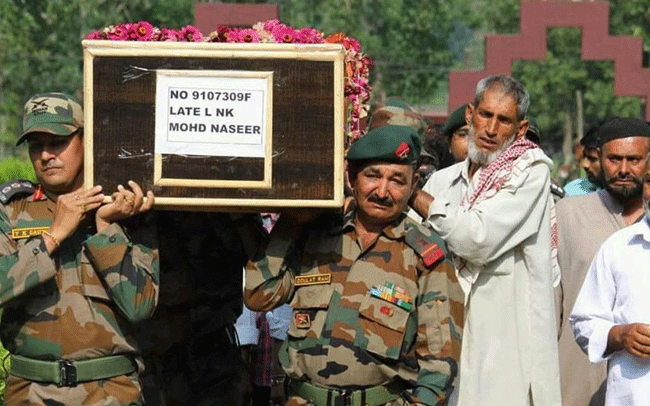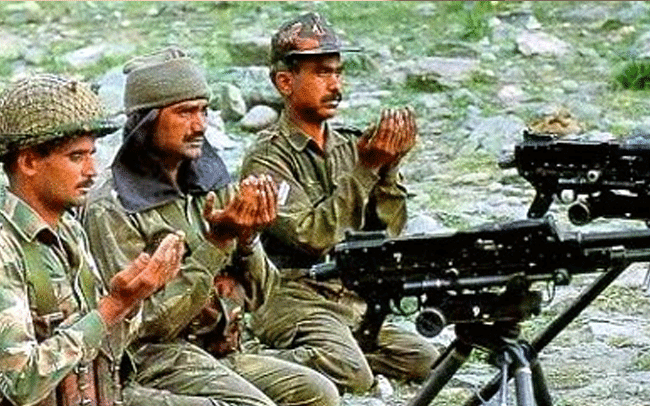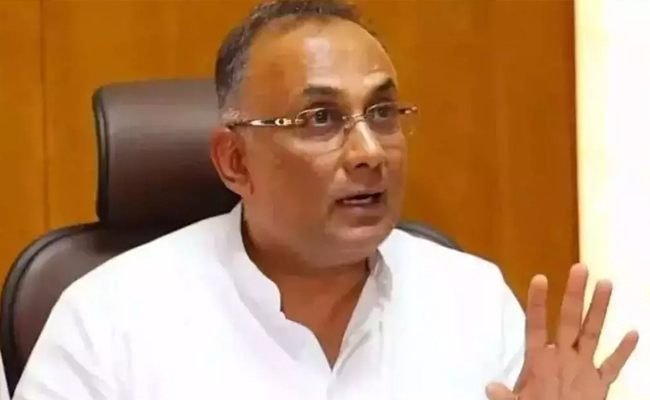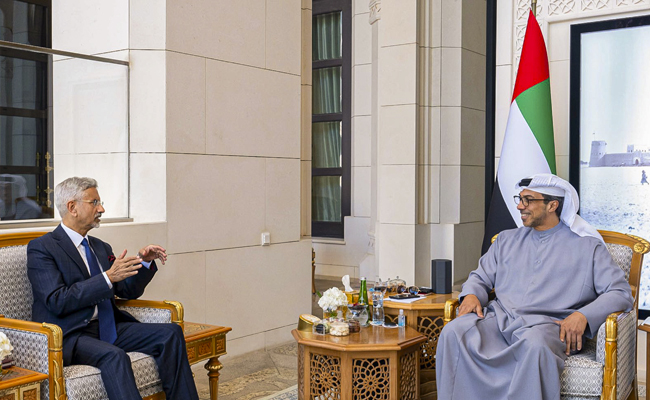Indian Muslims serving in the armed forces during the conflict in 1965 were honoured with several of the nation's highest military honours for gallantry. In 1965, during the Battle of Poonch, predominantly Muslim soldiers from the Rajput Regiment were victorious over the Pakistani Army and were able to take control of the region. The Param Vir Chakra was presented to Company Quartermaster Havildar Abdul Hamid as a token of gratitude for his brave acts during the Battle of Asal Uttar.
Air Commodore Idris Hasan Latif was promoted to the position of Chief of the Indian Air Force before he eventually retired after being awarded the Param Vishist Seva Medal for his service in the 1971 Bangladesh liberation struggle.
In certain parts of India, such as certain villages, it is traditional for at least one son to enlist in the Indian Army. In the Prakasam district of Andhra Pradesh, one of the villages where this phenomenon is observed is called Mallareddy Palli. In this region, the majority of the population identifies as Muslim. It is stated that the sons born in this village are brave and fearless and that they protect their country. Every boy of fighting age in this hamlet is conscripted and taken to the frontier to battle with the adversary. Every young man in this town gets up early and immediately gets to work in order to fulfil his lifelong ambition of joining the Indian Army.
Mallareddy Palli Village is home to numerous valiant troops who fought in the Indo-Pak Wars, Kargil War, and India-China War. The old here encourage the youth to serve their country by joining the military, and they support their efforts to continue this tradition.
There are 86 households that make their home in the village of Mallareddy Palli, and out of those homes, 130 young people have been assigned to guard the frontiers of the country. One of the most notable characteristics of this community is that its young people continue their service in the armed forces even after achieving higher levels of schooling.
There are no available official figures on the percentage of Muslims serving in the Indian armed forces. In the late 1990s, Mulayam Singh Yadav, who had previously served as India's Minister of Defense, declared that barely 1% of the country's armed forces consisted of Muslims. The number that was once present is unrecognisable compared to this current one.
Due to the fact that Muslims served as a primary source of the uprising for Indian independence, the British colonial government viewed its Muslim members in the military services with a high level of distrust. Despite the distrust, the percentage of Muslims serving in the Indian Army reached approximately 30 per cent just as the sun was setting on the British Raj. According to the minister of state for the defence at the time, this number had dropped to two per cent in a mere six years after it had initially been recorded. Prime Minister Nehru expressed serious concern and actively pursued measures to increase Muslim participation in the military.

There are no available official figures on the percentage of Muslims serving in the Indian armed forces. In the late 1990s, Mulayam Singh Yadav, who had previously served as India's Minister of Defense, declared that barely 1% of the country's armed forces consisted of Muslims. The number that was once present is unrecognisable compared to this current one.
In 2010, it came to light that Muslims accounted for 3% of those killed in the attack on the American military and 6% of the martyrs. The Indian Army said that in 2010, various actions resulted in the loss of 15 officers, 13 junior commissioned officers, and 159 men. Twelve of the soldiers who died in the line of duty were Muslims, which represents 6.41% of the total number of martyrs. Another fact worth noting is that ten of the twelve individuals served in the infantry unit of the Army.
The latest Agnipath scheme of the Indian government has raised protests from the majority of the ex-armed forces personnel and aspirants. The Agnipath scheme is a new initiative established by the Government of India on 14 June 2022 for the recruitment of non-commissioned officers into the three military services. The recruits will serve for four years, including six months of training followed by three and a half years of deployment. After retirement, individuals will be able to apply to remain in the armed services, and up to 25 per cent of those who apply will be selected for the permanent cadre. Personnel who retire after four years of service will not be entitled to a pension but will instead get a lump sum of about 11.71 lakhs.
In contrast to the majority, Muslim clerics encouraged the youth to participate in the programme. In June, the appeal was made from mosques in several regions of Uttar Pradesh before Friday prayers. The clergy also provided information about the programme, emphasising that applicants must have passed the Class 10 and Class 12 examinations.
The Indian Army is a secular organisation, and all officers and soldiers, regardless of religion, caste, creed, or gender, serve the nation with pride.
Girish Linganna
Aerospace & Defence Analyst
Let the Truth be known. If you read VB and like VB, please be a VB Supporter and Help us deliver the Truth to one and all.
New Delhi: A bill to set up a 13-member body to regulate institutions of higher education was introduced in the Lok Sabha on Monday.
Union Education Minister Dharmendra Pradhan introduced the Viksit Bharat Shiksha Adhishthan Bill, which seeks to establish an overarching higher education commission along with three councils for regulation, accreditation, and ensuring academic standards for universities and higher education institutions in India.
Meanwhile, the move drew strong opposition, with members warning that it could weaken institutional autonomy and result in excessive centralisation of higher education in India.
The Viksit Bharat Shiksha Adhishthan Bill, 2025, earlier known as the Higher Education Council of India (HECI) Bill, has been introduced in line with the National Education Policy (NEP) 2020.
The proposed legislation seeks to merge three existing regulatory bodies, the University Grants Commission (UGC), the All India Council for Technical Education (AICTE), and the National Council for Teacher Education (NCTE), into a single unified body called the Viksit Bharat Shiksha Adhishthan.
At present, the UGC regulates non-technical higher education institutions, the AICTE oversees technical education, and the NCTE governs teacher education in India.
Under the proposed framework, the new commission will function through three separate councils responsible for regulation, accreditation, and the maintenance of academic standards across universities and higher education institutions in the country.
According to the Bill, the present challenges faced by higher educational institutions due to the multiplicity of regulators having non-harmonised regulatory approval protocols will be done away with.
The higher education commission, which will be headed by a chairperson appointed by the President of India, will cover all central universities and colleges under it, institutes of national importance functioning under the administrative purview of the Ministry of Education, including IITs, NITs, IISc, IISERs, IIMs, and IIITs.
At present, IITs and IIMs are not regulated by the University Grants Commission (UGC).
Government to refer bill to JPC; Oppn slams it
The government has expressed its willingness to refer it to a joint committee after several members of the Lok Sabha expressed strong opposition to the Bill, stating that they were not given time to study its provisions.
Responding to the opposition, Parliamentary Affairs Minister Kiren Rijiju said the government intends to refer the Bill to a Joint Parliamentary Committee (JPC) for detailed examination.
Congress Lok Sabha MP Manish Tewari warned that the Bill could result in “excessive centralisation” of higher education. He argued that the proposed law violates the constitutional division of legislative powers between the Union and the states.
According to him, the Bill goes beyond setting academic standards and intrudes into areas such as administration, affiliation, and the establishment and closure of university campuses. These matters, he said, fall under Entry 25 of the Concurrent List and Entry 32 of the State List, which cover the incorporation and regulation of state universities.
Tewari further stated that the Bill suffers from “excessive delegation of legislative power” to the proposed commission. He pointed out that crucial aspects such as accreditation frameworks, degree-granting powers, penalties, institutional autonomy, and even the supersession of institutions are left to be decided through rules, regulations, and executive directions. He argued that this amounts to a violation of established constitutional principles governing delegated legislation.
Under the Bill, the regulatory council will have the power to impose heavy penalties on higher education institutions for violating provisions of the Act or related rules. Penalties range from ₹10 lakh to ₹75 lakh for repeated violations, while establishing an institution without approval from the commission or the state government could attract a fine of up to ₹2 crore.
Concerns were also raised by members from southern states over the Hindi nomenclature of the Bill. N.K. Premachandran, an MP from the Revolutionary Socialist Party representing Kollam in Kerala, said even the name of the Bill was difficult to pronounce.
He pointed out that under Article 348 of the Constitution, the text of any Bill introduced in Parliament must be in English unless Parliament decides otherwise.
DMK MP T.M. Selvaganapathy also criticised the government for naming laws and schemes only in Hindi. He said the Constitution clearly mandates that the nomenclature of a Bill should be in English so that citizens across the country can understand its intent.
Congress MP S. Jothimani from Tamil Nadu’s Karur constituency described the Bill as another attempt to impose Hindi and termed it “an attack on federalism.”



_vb_22.jpeg)

